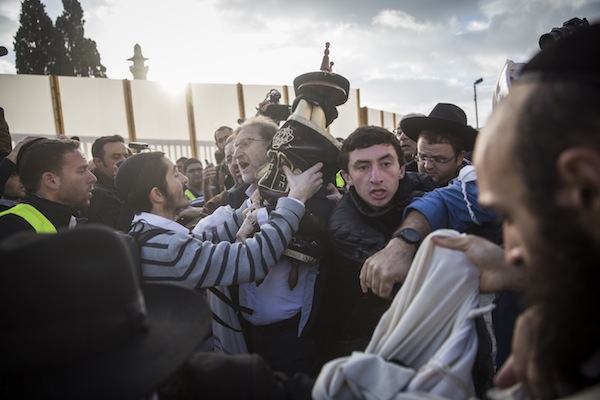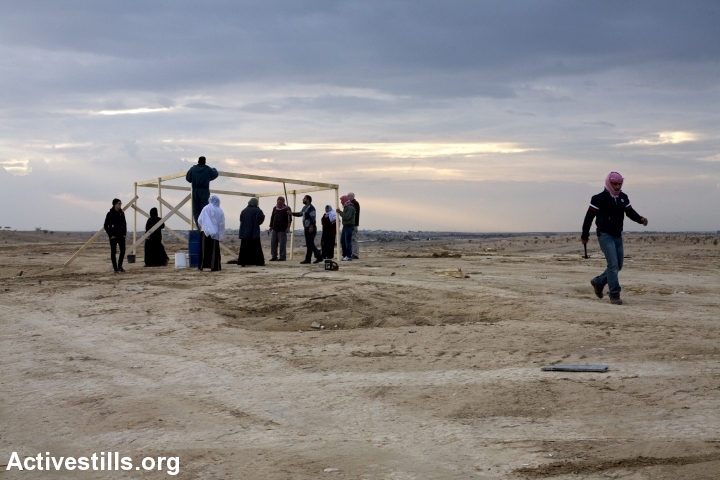As the 50th anniversary of the occupation draws near, those who consider themselves to be on the left cannot hide behind the battles that keep us in our comfort zone.
By Emily Hilton

Confrontations erupted at the Western Wall last week between security forces and activists from Reform and Conservative movement, after the activists broke through security barriers with torah scrolls in their arms, defying the ultra-Orthodox authorities that run the holy site.
The prayer rally was staged after the government failed to implement a resolution approved in January to create a pluralist prayer section at the southern end of the Western Wall.
In the aftermath of the pandemonium, a global plea of solidarity was sent out to diaspora Jewry to help support religious pluralism in Israel.
As a passionate and proud Reform Jew, I feel strongly that a Jewish state should reflect a diversity of Jewish practice. Praying with Women of the Wall this past summer was easily one of the most meaningful religious experiences I have ever had.
Yet there was another incident of violence that took place against a different minority in Israel last week, one that the media all but ignored: Israeli authorities demolished the Bedouin village of Al-Aqarib for the 105th time.
At the Western Wall and at Al-Aqarib we saw similar examples of Jewish violence — of the grip that an extremist faction has on public life and discourse. Yet the mainstream Jewish press, both in Israel and abroad, did not seem as interested in the experiences of those who do not belong to that small group of extremists.

(Keren Manor/Activestills.org)
For the past several years, the demonstrations at the Western Wall have been led primarily by Women of the Wall — a godsend to the liberal Zionist diaspora. They allow us to feel like we are feminist human rights warriors striving for an Israel that is more tolerant and just. Why? Because supporting Women of the Wall means that we do not have to think about the occupation and still feel like we are living out Jewish democratic values. They are an easy rallying cry for diaspora Jewry, since they do not force us to consider our own complicity in oppression.
Having been involved with numerous liberal Zionist organizations for the last few years, the increasing intellectual separation of “internal” and “external” issues in Israel makes it even tougher to have conversations about 1967, let alone 1948. That warm, fuzzy feeling one gets from supporting a ‘good cause’ gives the impression of a free pass from having to fight against other forms of oppression.
After all it is so much easier to stand up for a woman wearing a talit (Jewish prayer shawl) as a liberal, left-leaning Jew in London than it is to stand up for the residents of Al-Aqarib. A woman in a talit does not challenge our connection to Israel; if anything it only seeks to reaffirm it. Human rights abuses against those who are our other make us feel guilty. That is why it is far less painful to make torah scrolls and angry ultra-Orthodox men the focus of our righteous indignation.
As the occupation continues to muddy the water of all aspects of Israeli and Palestinian society, breaking the Right’s grasp on internal Israeli conflicts could have an effect on issues of race and gender in the country. But this argument only holds true if the voices that cry out over Robinson’s Arch shout just as loudly about Al-Aqarib, Susiya, and Umm Al-Kheir. It is the responsibility of those of us abroad, as well as organizations like Women of the Wall, to use the privilege and power we wield to call for justice and dignity for all of the inhabitants of Israel-Palestine, not just those who are like us.
As the 50th anniversary of the Six Day War draws nearer, those who consider themselves to be on the liberal left cannot hide behind the battles that keep us in our comfort zone. There is nothing noble in griping about the lack of egalitarianism at the Western Wall while sitting back and sipping wine produced in West Bank settlements.
Emily Hilton is Jewish anti-occupation activist based in the UK. She was a delegate on the Centre For Jewish non-Violence trip to the West Bank in July 2016. Follow her on Twitter at @emilyhilton.

